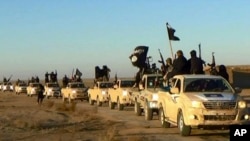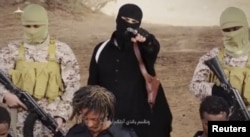The Islamic State reportedly has tightened its grip over internet access in its de facto capital in Syria, imposing tougher penalties and applying new tools for restrictions as it comes under increased pressure from U.S.-backed Syrian forces who are advancing toward Raqqa.
After the Kurdish-led Syrian Democratic Forces (SDF) began their offensive to free Raqqa in November, IS set up a special unit within its "security office" to monitor internet usage.
Since then, the unit "has arrested many online activists on charges related to cooperating with the [U.S.-led] coalition and other anti-IS forces," said Sadradeen Kinno, a Syria researcher who closely follows IS activities in Raqqa. Some of those detained by Islamic State forces have been executed, Kinno said.
The unit also includes female IS members who investigate women by searching their cellphones, personal computers and other devices, local reports say.
Surveillance
IS monitors have increased their surveillance of illicit internet use, roaming the streets in vans with devices designed to pinpoint internet usage and providers, according to reports from inside Raqqa.
"They have also obtained advanced Wi-Fi detectors from Turkey by which they can spot unpermitted internet users," said Dlshad Othman, a cybersecurity expert in Washington who co-authored a report on internet freedoms in Syria for Freedom House, a U.S.-based research center.
Othman, who has contacts in Raqqa, said that he knew a young man who was executed by IS in recent weeks for using an application to communicate with his relatives in a Kurdish-controlled area.
Internet service in Raqqa is strictly controlled by IS. Residents are told they can access the web only at public cafes that are under the direct watch of IS, which monitors what sites are accessed and limits the ability to communicate with the outside world.
"Owners of these cafes can't operate without obtaining licenses from IS," said Hussam Eesa, a member of Raqqa Is Being Slaughtered Silently, an activist group that reports on IS abuses in Raqqa.
Owners of internet cafes must regularly report to IS on suspicious customers who could be in contact with anti-IS groups, Eesa said.
Punishment
Several cafes were recently shut down after IS found that their owners were providing internet access to nearby households, the activist group said.
One man, who escaped IS rule in Syria two months ago, said that he had faced a severe punishment for frequenting a website affiliated with Syrian rebels.
"I spent two months in an [IS] prison for visiting a Europe-based website that is affiliated with the [Syrian] opposition," said a 34-year-old Syrian man from Deir Ezzor, an IS-held city not far from Raqqa.
"I was tortured and almost saw death with my eyes," said the man, who spoke to VOA on condition of anonymity for fear of retribution from IS. He now lives in Turkey. "I was released after I signed on paper not to visit those types of websites anymore."
Since September 2016, IS has arrested more than 19 people in Raqqa and its countryside for possessing satellite internet devices, reported Smart News, a pro-rebel Syrian website.
Observers believe that IS will increase its suppression on internet users and limit access to information as its territorial gains decrease. And with the SDF fighters only miles from Raqqa, IS tries to keep their advances from people inside the city.
"They don't want people under their rule to see that their caliphate is diminishing," cyber expert Othman said.
Activist Eesa said IS is attempting to keep locals from being online "to hide their military losses from their supporters and local residents."















